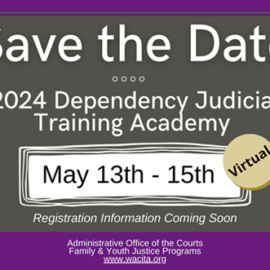Disposition Hearing Marci Comeau[1] 2024[1] A dependency disposition order is intended to provide a parent with a program designed to alleviate danger to the child, to mitigate or cure any damage the child has already suffered, and to aid the parent, guardian, or legal custodian (“the parent”[2]) so that the child will not be endangered in the future.[3] The disposition order should include the following: a service plan for parents and the child; the placement of the child; and a
Dash Demo
HCA Presentation Documents (FWCC 4/15/24)
Below are links to download the materials presented by the Health Care Authority at the April 15th FWCC meeting.
Fact-Finding Hearing
Marci Comeau[1] 2024[1] “…The Due Process Clause of the Fourteenth Amendment protects the fundamental right of parents to make decisions concerning the care, custody, and control of their children.”[2] If the State seeks to interfere with this fundamental right, the legislature has provided a procedure by which a child may be declared “dependent[3].” The procedure includes a fact-finding trial or hearing in which the petitioner, generally the Department of Children, Youth and Families, (“the Department[4]”) bears the burden of establishing
Data Informed Courts
FYJP’s court improvement work is data informed, sensitive to local culture and needs, and mindful of the multi-system nature of dependency court practice. Dependency court communities interested in using data to assess the effectiveness of system processes and outcomes can request FYJP’s support. We will work with you to identify and assemble data for analysis and help interpret results. We can also assist with interpreting research studies and identifying implications for improving practice. The Washington State Center for Court Research (WSCCR) Provide
In the Matter of the Dependency of A.R.W.-M.
Filed February 28, 2024 Court of Appeals, Div III: Regarding court’s finding that termination was in the best interest of the child.
Parent Representation in Child Welfare Proceedings
Parent Representation in Child Welfare Proceedings Sharea M. Moberly[1] 2024[1] Statutory Right of Counsel RCW 13.34 creates a statutory right to counsel for a child’s parents, guardian, or legal custodian involved in dependency or termination proceedings and provides that if such an individual is indigent, counsel shall be appointed by the court.[2] This statutory right to counsel covers all stages of the dependency and termination proceedings including hearings to establish an RCW 13.36 guardianship.[3] Washington State case law recognizes that an indigent
Save the Date: 2024 Dependency Judicial Training Academy

Every year, FYJP holds a multi-day judicial training academy focused on child dependency cases. In collaboration with judicial and system partners, we strive to create and deliver in-demand content that supports judicial officer practice and system leadership. This virtual academy is open to judicial officers, court administrators, and FJCIP coordinators.
2023 All Sites
You can access the web page for our meeting here: https://www.wacita.org/3rd-annual-washington-all-sites-meeting/




